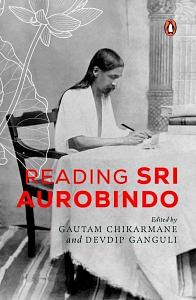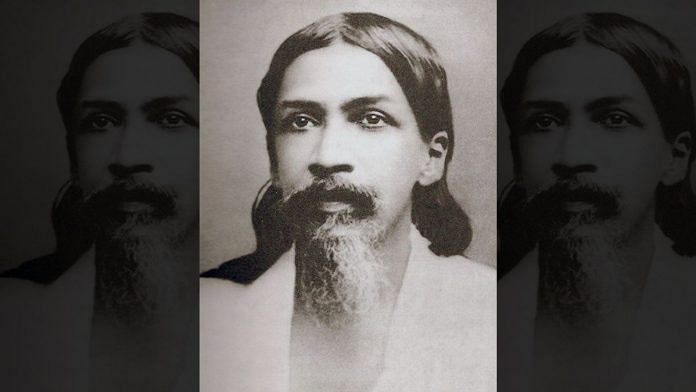As editors, Devdip and I approach Sri Aurobindo from two different worlds, but are integrally united by his ideas. Devdip is a second-generation student of the Ashram School and a fourth-generation resident of the Sri Aurobindo Ashram; I a first-generation devotee of Sri Aurobindo. Devdip chose to remain in the Ashram after he graduated; I stand rooted in what is known as the ‘real’ world. He not only serves the Ashram but is also a writer and speaker on Sri Aurobindo and a teacher to undergraduate students; I work at a think tank and contribute to the Ashram whenever I’m in Pondicherry. He engages with my world through the prism of Sri Aurobindo; I work with his from the vantage point of an outsider-insider. That said, both of us are rooted in the philosophy and spiritual paths of Sri Aurobindo’s Integral Yoga.
In this volume, we bring a diverse set of devotees to our pages, and despite differences, find harmony and resolution between the external and the internal, the scholar and the doer, the witness and the actor. In doing so, we realize how Sri Aurobindo’s integrality sweeps across geographies, times, and beings, unites them in a sublime harmony, and allows each to evolve in his unique manner.
Is there a ‘favourite’ book, a book that resonates more with me than others? Try as hard as I can, but the answer is ‘no’. At different times, I have followed several streams of Sri Aurobindo’s thoughts through different books. Sometimes, the same thought is expressed across varied volumes. I found analyses of the Bhagavad Gita in Essays on the Gita, of course; but there are deep references and intense chapters on the subject in The Synthesis of Yoga, The Life Divine, Vedic and Philological Studies, apart from shorter gleanings in several Letters on Yoga or take ideas such as the Integral Yoga, surrender, and the Supramental, which find space across several books such as Essays Divine and Human, The Secret of the Veda, and Letters on Himself and the Ashram. In fact, one way to read Sri Aurobindo is to follow one idea across various books.
Also read: Auroville is having a Crown headache — The laboratory of evolution is divided
The one book that accompanies me everywhere, from home to office, in India or abroad, while working or travelling, is The Mother. In six concise chapters, Sri Aurobindo brings home his core philosophy. The chapter on money, alone, can question the world of economics and finance and challenge our set ideas about it in a single line, ‘Money is the visible sign of a universal force.’ The other book I often return to is Essays on Philosophy and Yoga. The one essay I read at least twice a year, and find new insights from it on every reading, is the ‘The Bourgeois and the Samurai,’ now a chapter in Bande Mataram. The first time I read it, it felt like Sri Aurobindo was giving me an intellectual lashing; now, I have reconciled to my failings and I dare say changed a bit. But I read it repeatedly—it keeps me grounded. In our loud world of noise, another chapter I repeatedly read is ‘The Strength of Stillness’, in Essays in Philosophy and Yoga: ‘Silence prepares, speech creates. Silence acts, speech gives the impulse to action. Silence compels, speech persuades.’
On the other hand, the one book I have never been able to finish or even progress beyond a canto is his epic, Savitri. Sri Aurobindo worked on this book first in 1916 and last in 1950. It has been stitched to perfection and is undoubtedly his greatest work. I find this poem so intense that it is difficult to comprehend it beyond a few lines. The reading of this book has been a journey for me. It began on the mental plane and now in the psychic. There is a mantric quality to Savitri’s verses that the mind cannot understand; it has to be read by the heart, in silence, with full concentration, calmness. ‘Then,’ the Mother said in a conversation with a disciple, ‘the words, rhythms, vibrations will penetrate directly to this white page, will put their stamp upon the brain, will explain themselves without your making any effort.’ Savitri, she says, is a book that can help aspirants climb the highest peaks: ‘He has crammed the whole universe in a single book.’
How, for instance, do you even begin to grapple with these lines:
Then something in the inscrutable darkness stirred;
A nameless movement, an unthought Idea
Insistent, dissatisfied, without an aim,
Something that wished but knew not how to be,
Teased the Inconscient to wake Ignorance.
Savitri remains a height I still need to climb, an intellectual-psychic adventure I still need to embark on.
When we place ourselves in the ocean of his writings as humans that are still evolving and our current status transitional, reading Sri Aurobindo becomes an even more exciting voyage. Two persons reading the same text will emerge with different perspectives. This is not surprising—each individual is unique and the information, knowledge and experiences with which one reader absorbs and engages with the same truths will naturally be different from another. But what makes it a constant quest is that even the same reader reading the same book of Sri Aurobindo at two different times will read the truths differently. Not just the book, even a chapter or a few verses will impact the reader in different ways at different points of evolutionary journey.
Also read: Aurobindo inspired Bengali patriot Khudiram Bose to shake British Raj foundations
Reading Sri Aurobindo is like entering a textual truth universe that spans the past, founds the present and envisions the future. Savitri, for instance, is a journey towards a future destined, a future where matter has been divinised, spiritualised. As we aspire to enter this future, we ‘know’ that future lies within us. We are the matter, we the mind, we the psychic, we the spiritualised. The universe, therefore, comprises outer worlds as well as inner countries. The integrality of his yoga thus transcends matter, life, mind and spirit, and points to a Supramentalised universe of space as well as time. The body is where the yoga happens, it is the playground of psychic growth, a bridge that carts the evolutionary cycle forward. Not in after-worlds, not in post-death…evolution happens in this universe, on this planet, through this body.
The twenty-one contributors in this volume have engaged with these texts for a long time, evolving with them. Some of them are teachers, some writers, politicians, thinkers, editors. All of them explore Sri Aurobindo from their respective vantage points and evolutionary states of being. Their perspectives and insights are only a starting point for your own journeys. When you embark on this adventure of reading Sri Aurobindo, it will be an experience uniqueto you, chiselled and driven by you. Despite having almost read all the books here, when I read some of the chapters by the contributors, they forced me to rethink what I know, got me to revisit my own reading of the text, and in an integral synthesis, expanded my outlook. In other words, reading Sri Aurobindo is like reading the scriptures.
 This excerpt from Reading Sri Aurobindo, edited by Gautam Chikarmane and Devdip Ganguli, has been published with permission from Penguin Random House India.
This excerpt from Reading Sri Aurobindo, edited by Gautam Chikarmane and Devdip Ganguli, has been published with permission from Penguin Random House India.



